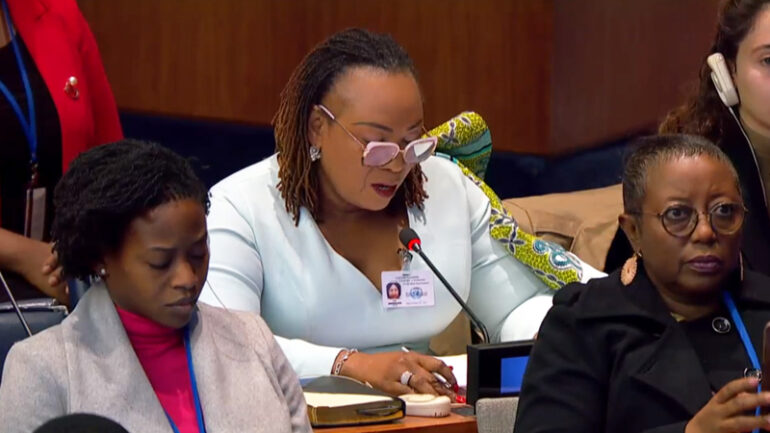Commission on the Status of Women, Ministerial round table (CSW68)

- Posted by admin
- Posted in News, Statement & Remarks, UN News
Hon. Mavis Hawa Koomson
Minister Temporary Responsible for
Gender, Children and Social Protection.
United Nations, New York
March 12, 2024
“MOBILISING FINANCING FOR GENDER EQUALITY AND EMPOWERMENT OF ALL WOMEN AND GIRLS: POLICIES AND STRATEGIES TO END WOMEN’S AND GIRLS’ POVERTY”
Chairperson, Excellencies, Colleague Ministers,
I am happy to be present at this Ministerial Round Table and to join you all to discuss how best we can address a critical issue at the core of our sustainable development efforts: empowering women and girls.
On our part in Ghana, we have made significant strides by implementing robust policies to enhance women’s participation in the labor market and to sharpen their entrepreneurship. Moreover, we have developed a framework for tracking and improving women’s employment conditions and have actively promoted women-led businesses through the Ghana Enterprises Agency. Additionally, initiatives like the Ghana Women Entrepreneurship Summit and the Mastercard Foundation Recovery and Resilience Programme have positively demonstrated our commitment to women’s economic empowerment.
Furthermore, financial inclusion is a cornerstone of our strategy. Through the Microfinance and Small Loans Centre (MASLOC), Ghana has prioritized financial allocations to women, especially rural women, with 85% of our loans disbursed to them. Similarly, our YouStart programme, which focuses on youth and women-led businesses, has underscored our dedication to nurturing future generations.
In pursuit of global gender equality, Ghana will like to highlight six (6) key measures:
• Firstly, prioritizing quality education and vocational training for girls.
• Secondly, enhancing women’s access to financial resources and services.
• Thirdly, implementing policies that uphold gender equality and protect women’s rights.
• Fourthly, investing in healthcare services, with a particular emphasis on maternal and child health.
• Fifthly, promoting mentorship programs and building the capacities of young girls.
• Lastly, relying on data-driven strategies to inform and refine our policies.
These initiatives reflect Ghana’s belief in the transformative power of women and girls. We recognize that their empowerment is not just a women’s issue, but a fundamental human issue, pivotal to the prosperity of our global community. To paraphrase Kwegyir Aggrey of Ghana, the education of a man has an individual effect, but that of a woman has a national effect. We could substitute education for empowerment and we would not be wrong.
In conclusion, Ghana reaffirms its unwavering commitment to enhancing the economic, social, and health empowerment of women and girls. We are expectant that the rich exchanges at this Ministerial round table meeting will be of immense value to Ghana. We look forward to a future where gender equality is not just an aspiration but a lived reality.
I thank you for your attention.
